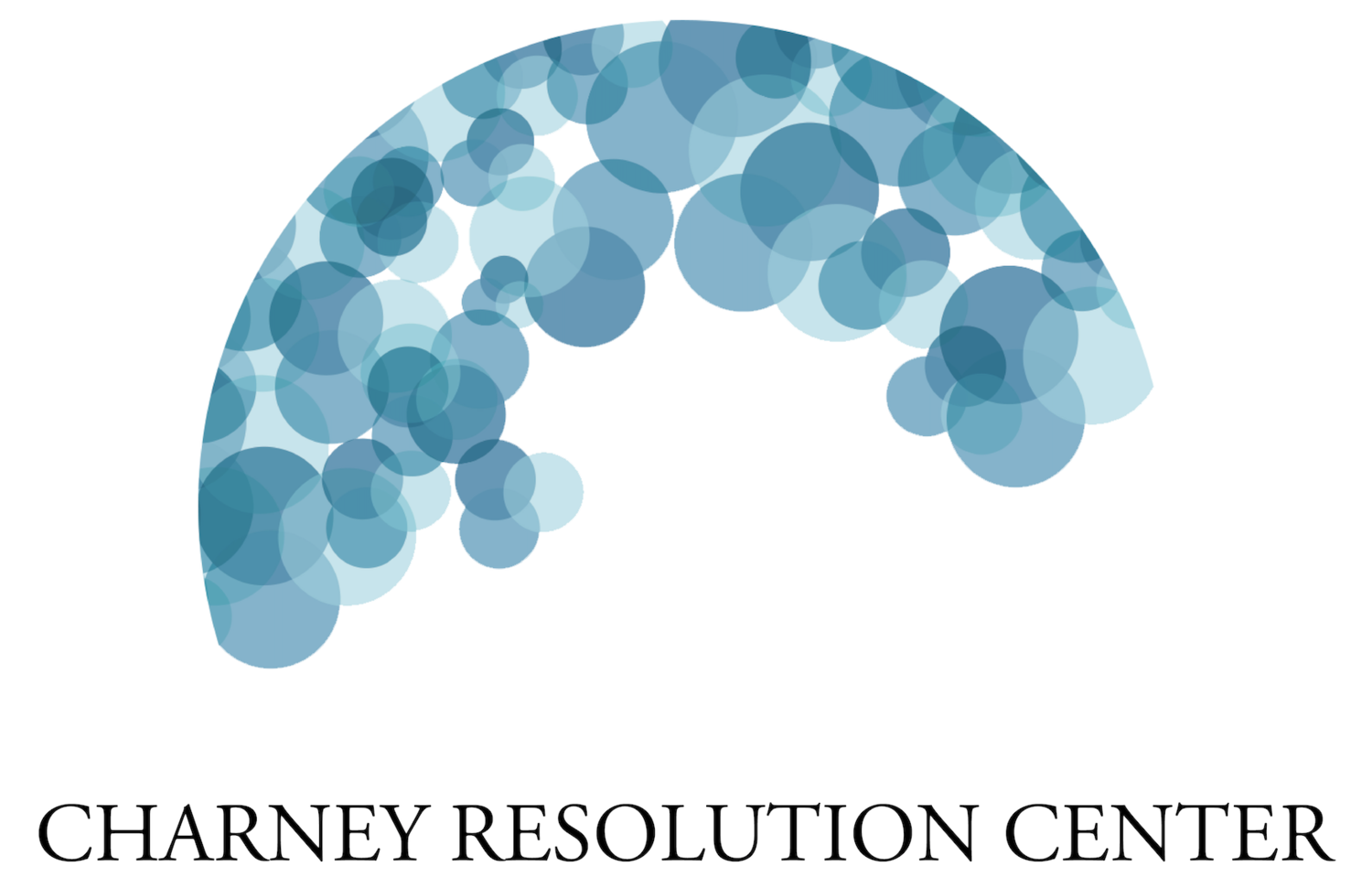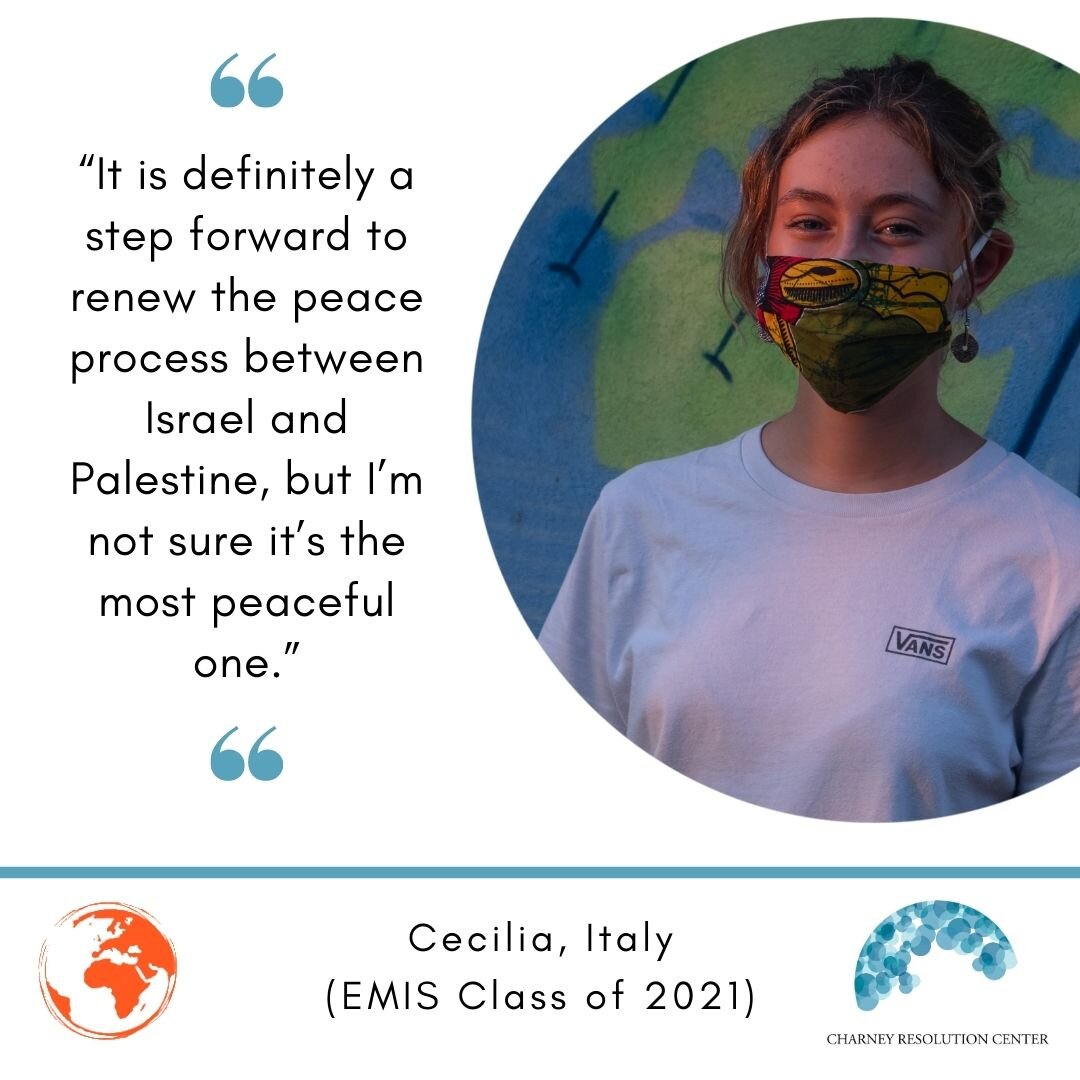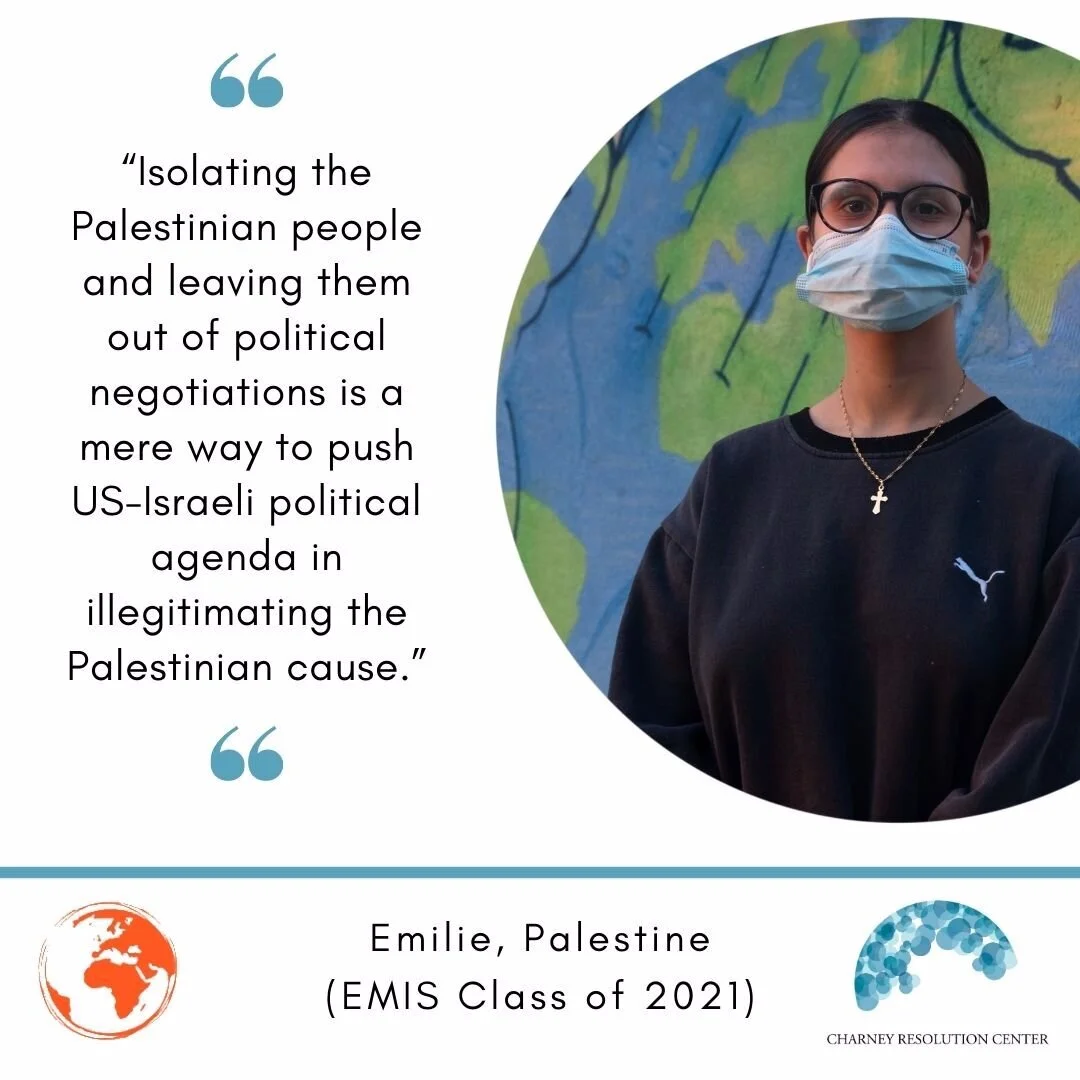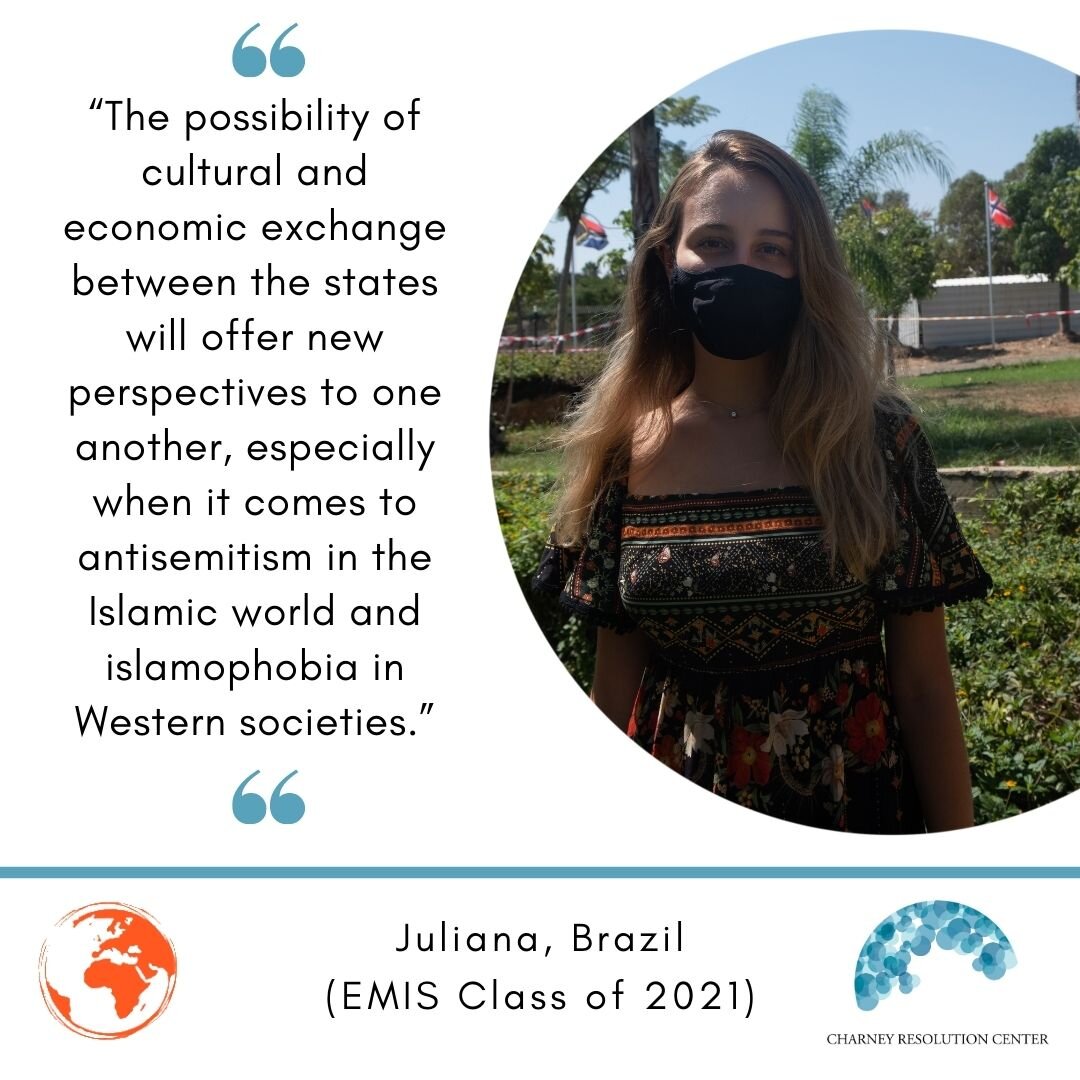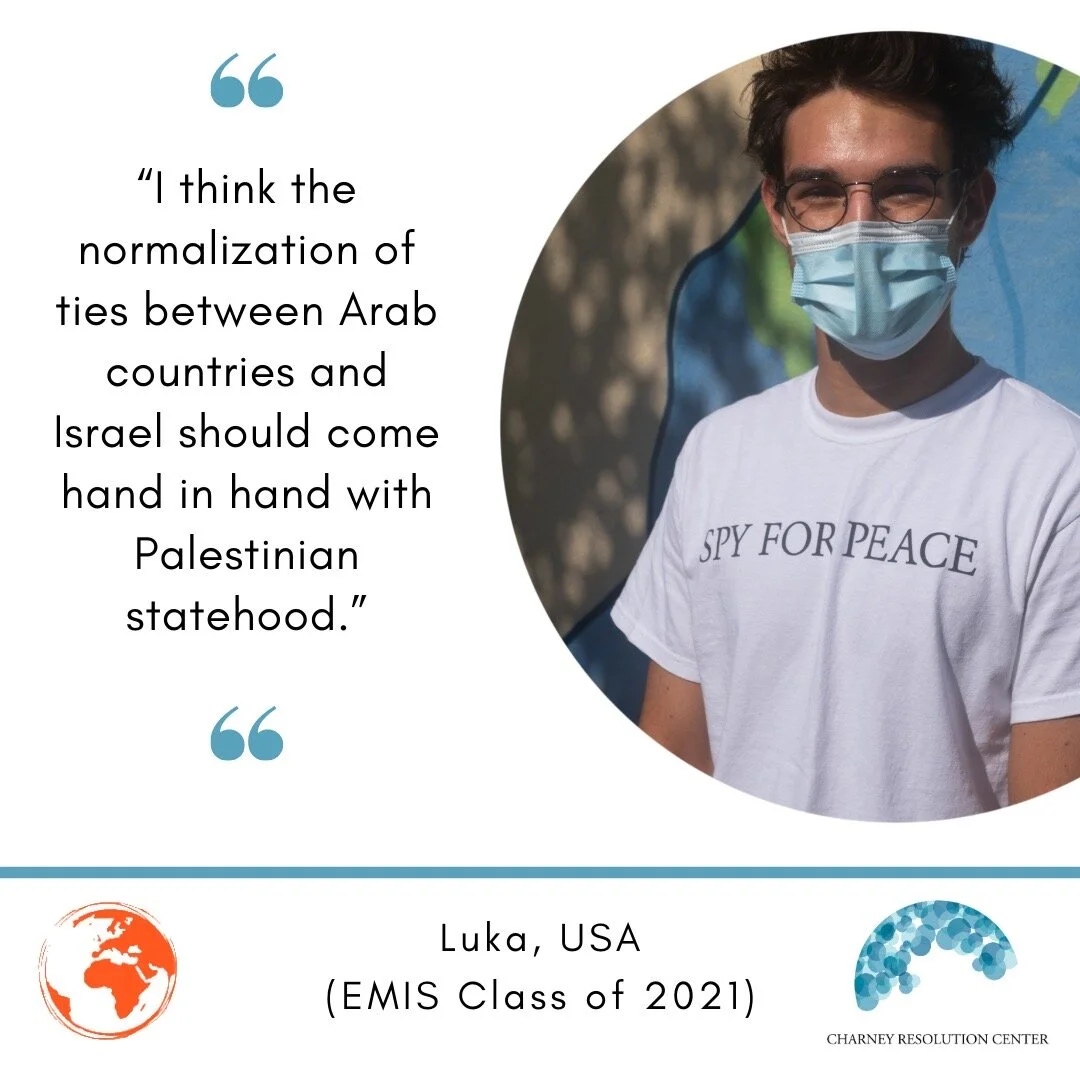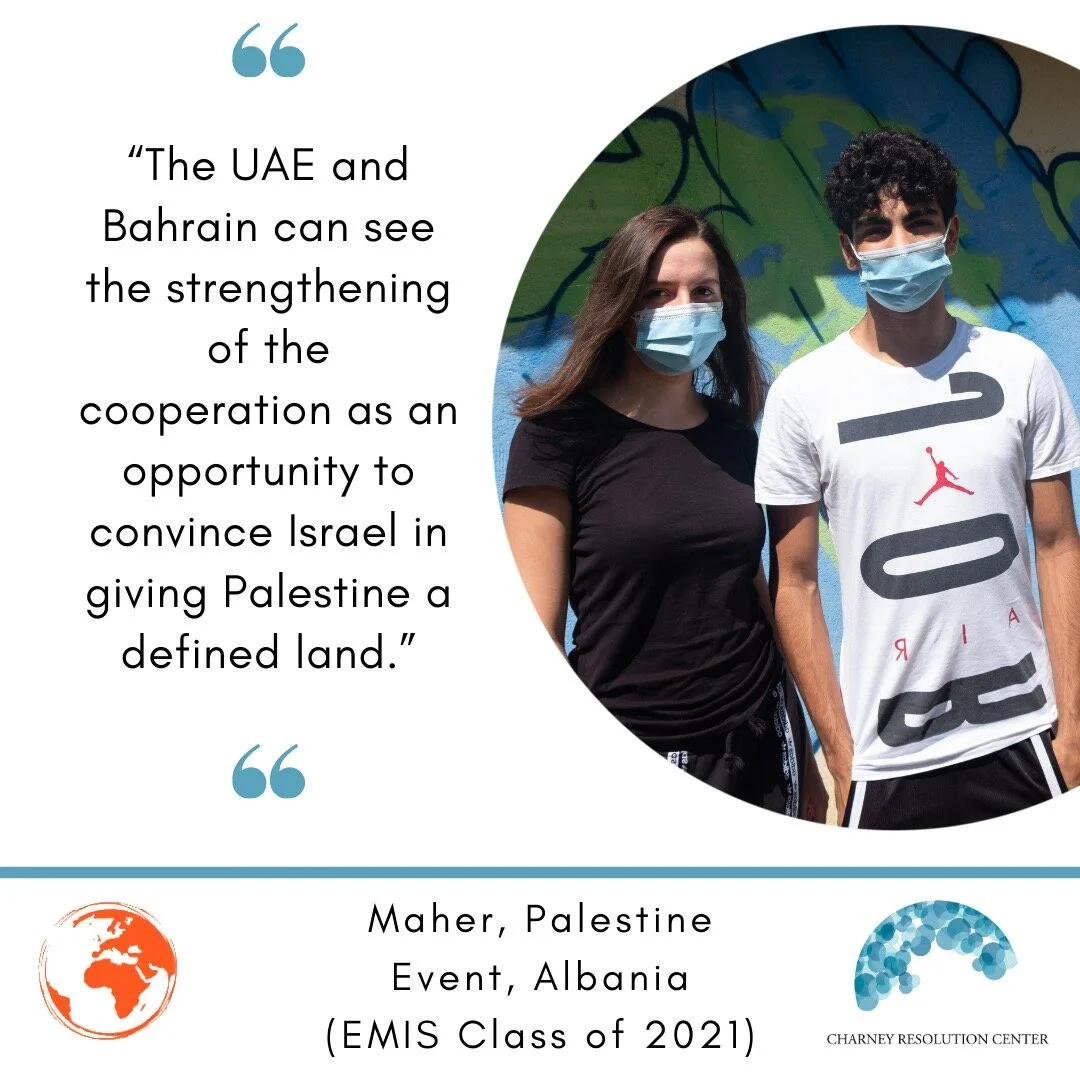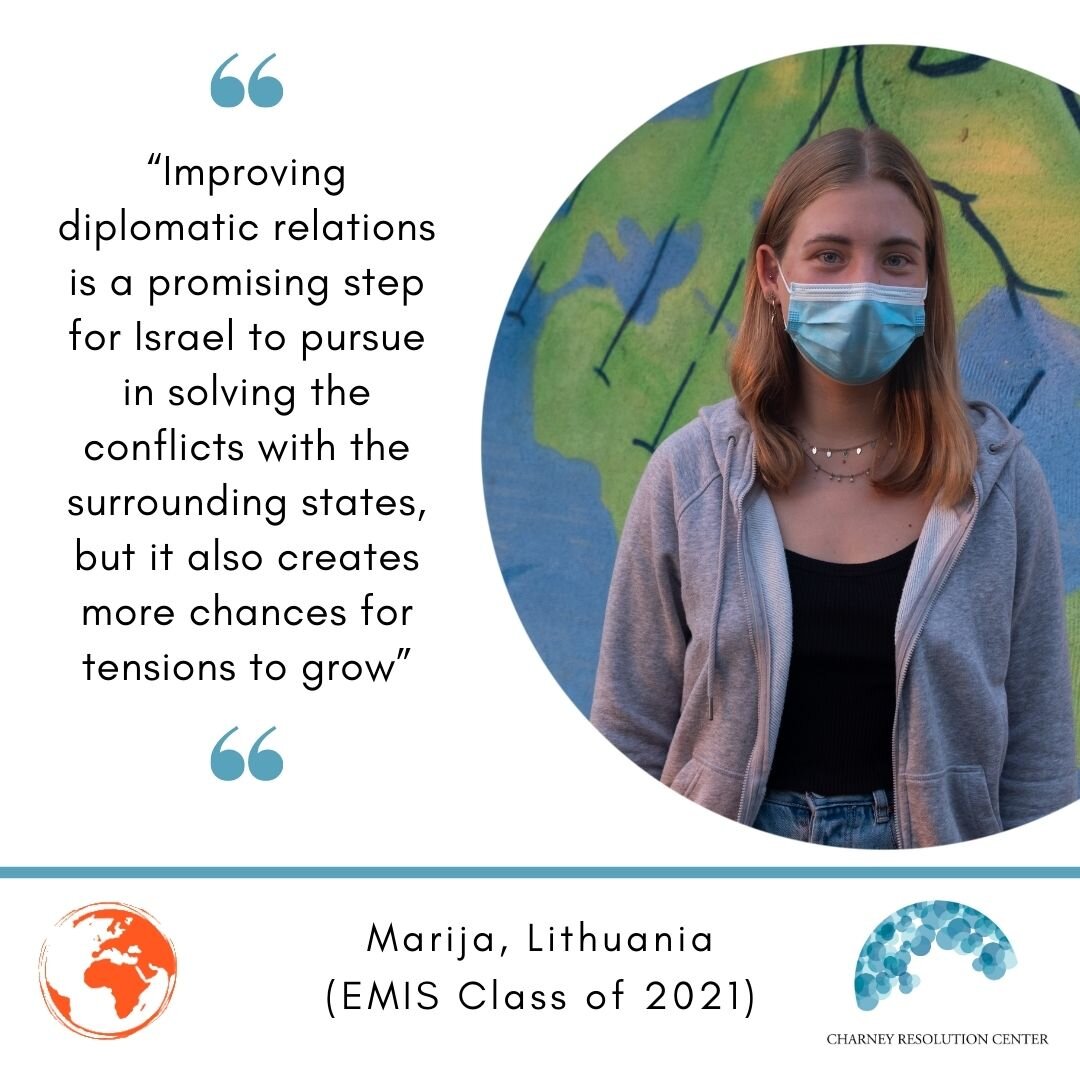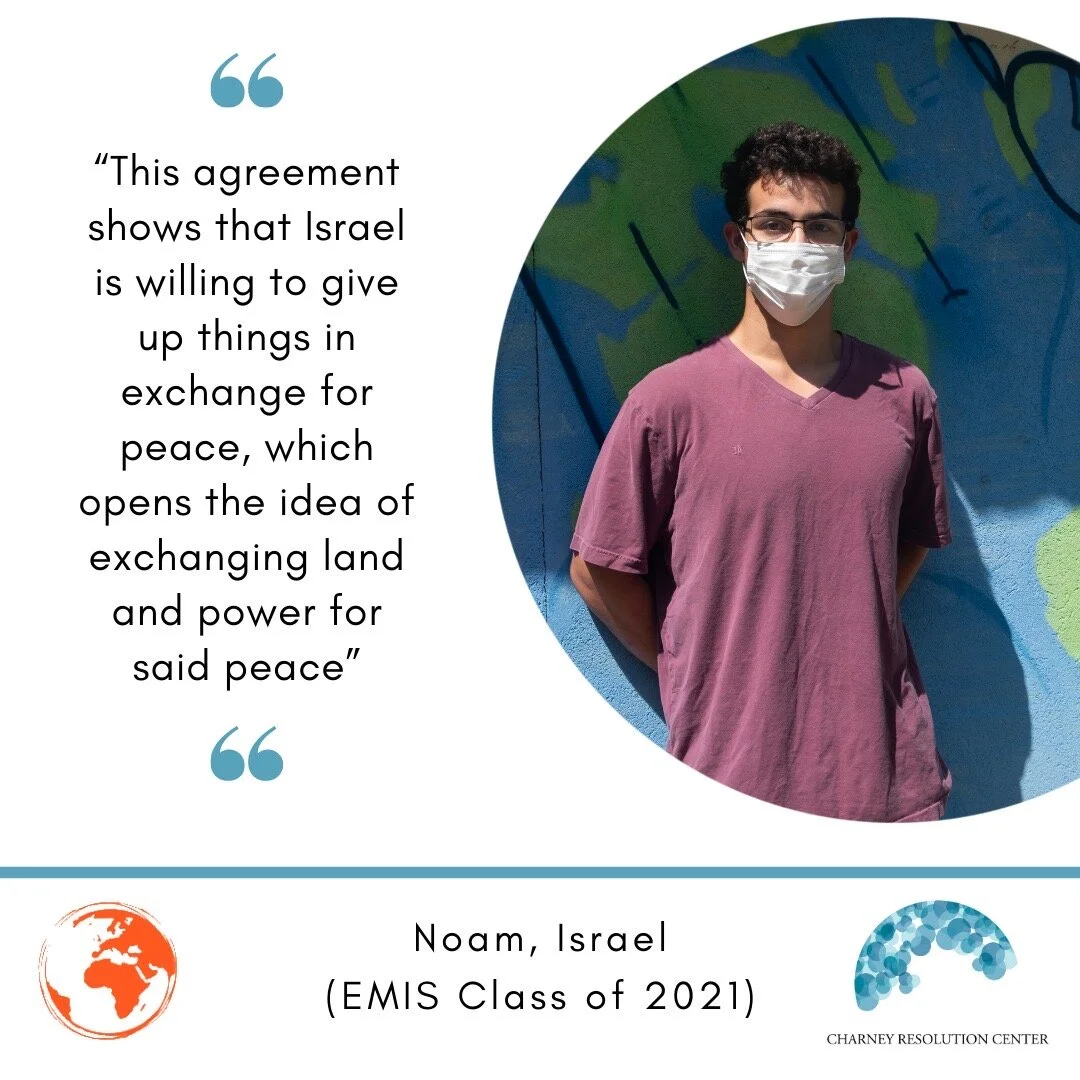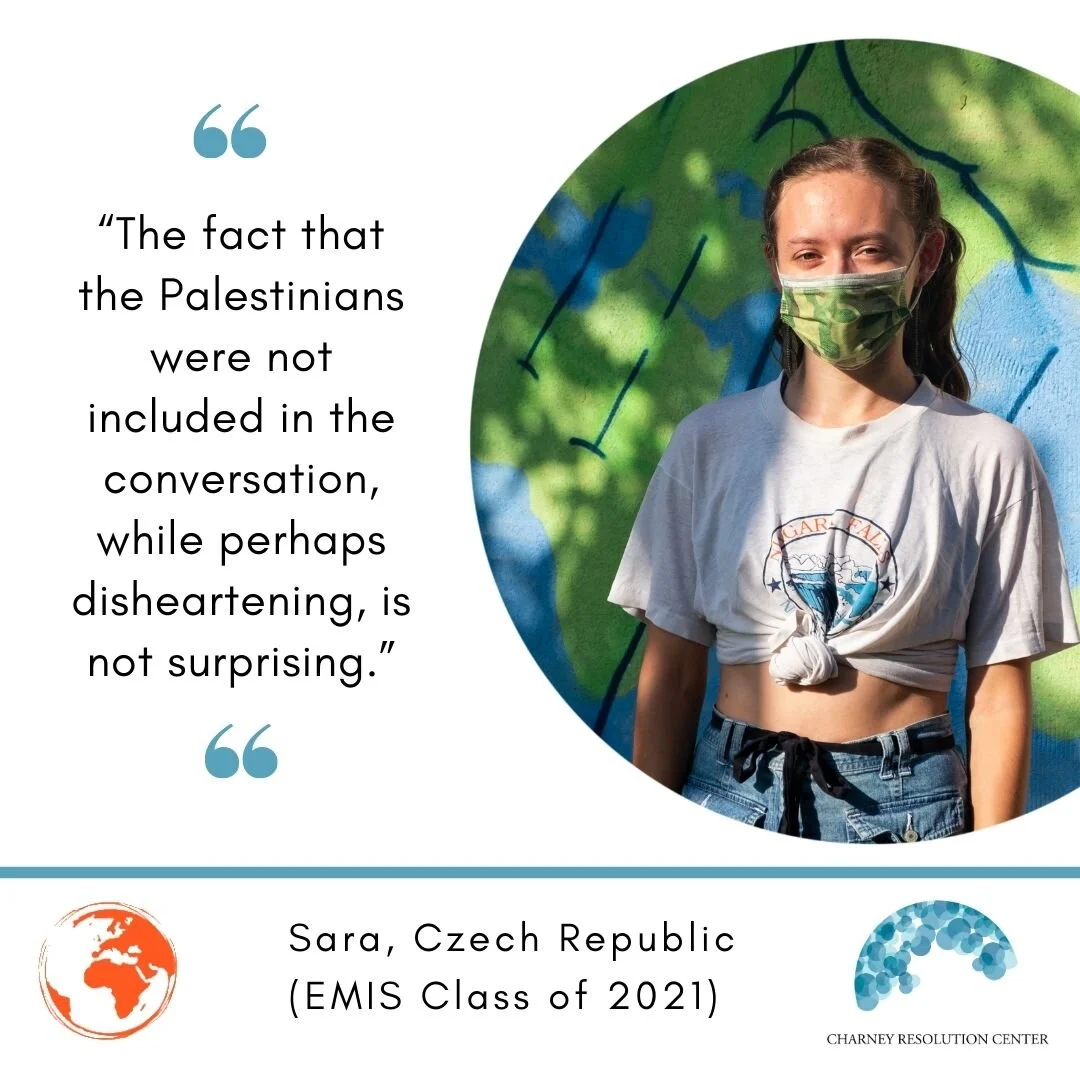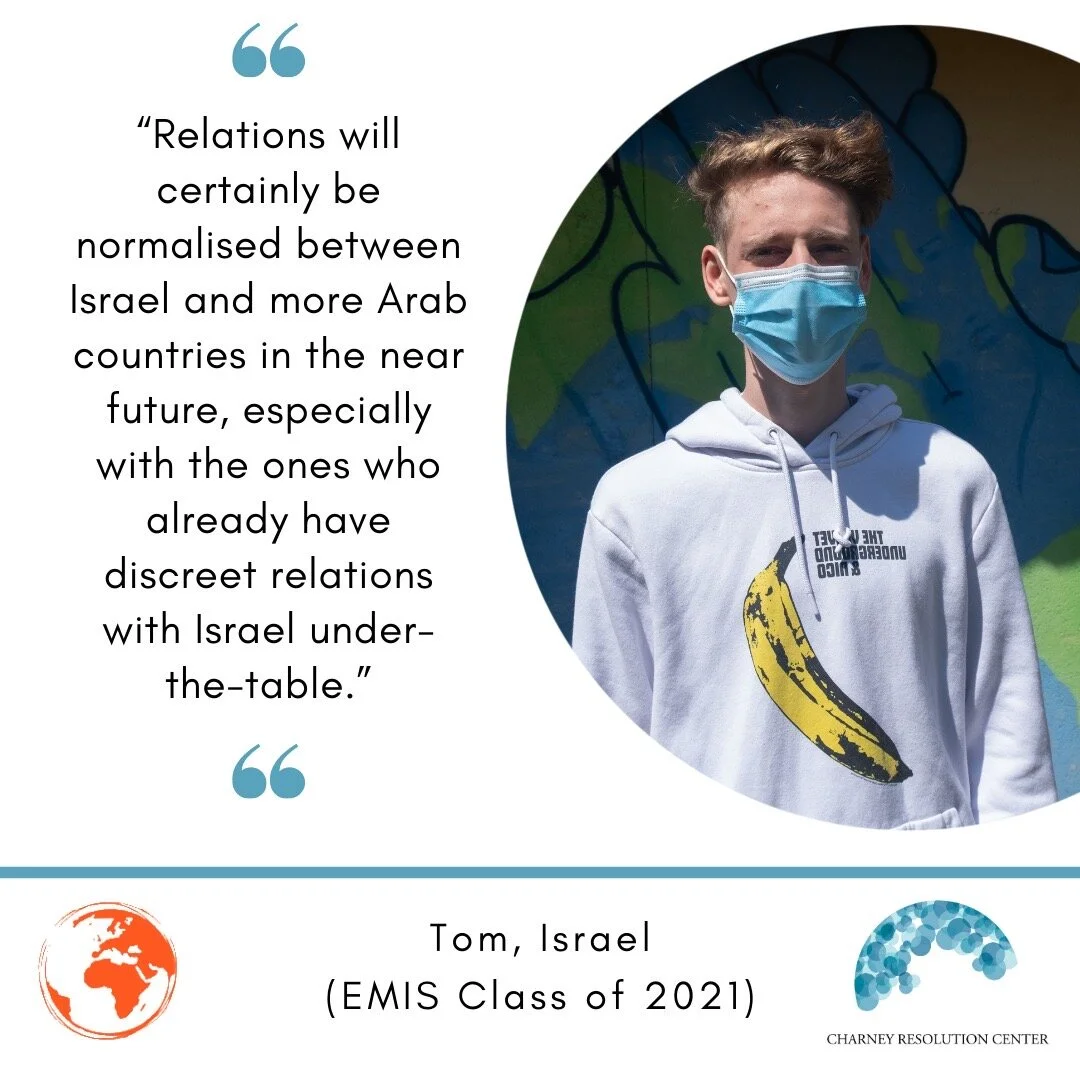On September 15th the historic ‘Abraham Accords’ were signed between Israel and the United Arab Emirates and Bahrain, with the help and supervision of the Trump administration. Through this agreement, both Gulf Arab States officially normalized diplomatic and economic relations with Israel, committing to a higher degree of cooperation in the future. While it is certainly a step forward in the relations between Israel and Middle-Eastern Arab countries, some think the motive is not the desire for peace, but rather economic interests and the creation of an alliance against the nuclear threat of Iran. Furthermore, a part of the Arab world and of the international community heavily criticized the agreement, claiming it normalizes the humanitarian and political crisis that is still happening in Palestine. The Charney Resolution Center decided to interview a few EMIS students from the upcoming graduating class of 2021. The Eastern Mediterranean International school is based in Hakfar Hayarok, where Israeli, Palestinian and international students live together and collaborate with CRC on several projects involving mediation and conflict resolution.
Should this agreement be called a ‘peace agreement’? After all, Israel is not at war with the Emirates and Bahrain and there has been some extent of economic and diplomatic relations in the past few years.
No, I believe it shouldn’t be called a “peace agreement” as the diplomatic relations with Emirates and Bahrain haven’t changed drastically, from an agitated status to a calmer one. I actually think that the agreement could lead to more confusion than there had been before.
How do you think this will affect the relation between Israel and the rest of the Arab world? Do you think more countries in the region will follow in normalizing relations with Israel?
I think that the rest of the Arab world will feel the significance of this agreement both in an economic and diplomatic point of view. Yet, I believe that most of the Arab countries won’t give up their ideology that easily, so I would say that the relations between Israel and the Arab world may get worse.
What does it represent that the Palestinian people were once more excluded from dialogue regarding peace in the Middle East?
In my opinion, the Palestinian people live such reality daily and the agreement is a formalized example of what they have to deal with everyday: exclusion.
Do you think the improvement of relations between Israel and some arab countries can be seen as an opportunity to renew the peace process between Israel and Palestine?
I think that the agreement holds much significance and that’s why it represents a change that will have effects in the Middle East. It is definitely a step forward to renew the peace process between Israel and Palestine, but I’m not sure it’s the most peaceful one.
How do you think this will affect the relation between Israel and the rest of the Arab world? Do you think more countries in the region will follow in normalizing relations with Israel? I think it is in the Arab world’s best interest to launch officialised relations with Israel, especially economically and national security. This deal allows the UAE to erect commercial, security, and officialised public ties with Israel whilst maintaining the narrative that it is attempting to demolish Israeli annexation and occupation. As for the economic interests behind it, UAE will gain access to Israeli and US weaponry, as did Egypt following its peace agreement with Israel in 1979. Furthermore, the gulf states are suffering a huge hit due to their involvement in the Yemen War, and this deal will serve as an opportunity for the UAE and the other states to follow to improve its image and exercise dormant soft power before the entirety of the disapproving international community. The timing of this deal is of great relevance, an age of a global pandemic, where states are struggling to make ends meet for their citizens; therefore, it no surprise that the UAE is pursuing a diplomatic relationship with a state that is a leader in medical healthcare, an aspect gulf states have proven to be lacking. When observing the current political landscape, a common enemy and rival is noted, Iran, a state that poses as a threat to all stakeholders involved. The gulf member states and Israel are heavily interested in eradicating political Islam as it is perceived as a destabilizing force. Therefore, the interest of people and individuals are not at heart, but rather the enforcement of an economic and political agenda is.
What does it represent that the Palestinian people were once more excluded from dialogue regarding peace in the Middle East? The Arab world is not interested in the Palestinian cause, as seen in its very evident ambivalence and polarization of middle eastern politics, and it has become increasingly evident that it is merely using the excuse of being political activist for Palestinians to justify the deals recently enacted between them in Israel. The deal did suspend an official Israeli annexation of the West Bank, though this does not mean that no unofficial annexation will occur as it does at this very moment. During the Palestinian Authority’s lockdown due to the covid-19 pandemic, a new Israeli settlement within the parameters of the identified Palestinian Territories was launched. This shows that suspending or freezing an official annexation is not synonymous with a lack thereof. This deal clearly conveyed the message that Arab states will not be awaiting Palestinian satisfaction with Israel as it was completely left out of the discussion for each to pursue their own political interests, at the expense of others.
Do you think the improvement of relations between Israel and some arab countries can be seen as an opportunity to renew the peace process between Israel and Palestine?No. If anything, this will make Palestinian living standards and the Palestinian fight for a sovereign state even more unlikely, with Israel receiving the benefits and no price to pay. The Arab world normalizing relations with Israel further debilitates the possibility of a Palestinian state as the occupation goes unnoticed and Israel avoids accountability. This also means that the Palestinians will be further isolated from the Arab world, especially with the Palestinian response of withdrawing ambassadors from Abu Dhabi. Isolating the Palestinian people and leaving them out of political negotiations, as already done with the ‘‘Deal of the Century’’ is a mere way to push US-Israeli political agenda in illegitimating the Palestinian cause.
Should this agreement be called a ‘peace agreement’? After all, Israel is not at war with the Emirates and Bahrain and there has been some extent of economic and diplomatic relations in the past few years.
The word “peace” depends on who is looking at it. For Israelis, it means the cease of hostilities, an opening of new possibilities and accords with Arab countries, while for Palestinians, it means betrayal. Although, the possibility of cultural and economic exchange between the states will offer new perspectives to one another, especially when it comes to antisemitism in the Islamic world and islamophobia in Western societies. If the terminology “peace” fits the Abraham Accords, count on a series of future outcomes: will Israel follow the condition of stopping the annexation of large parts of the West Bank? Will the accords trigger more conflict and war in the region?
How do you think this will affect the relation between Israel and the rest of the Arab world? Do you think more countries in the region will follow in normalizing relations with Israel?
I see two possible results: either a division and rise of tensions in the Arab world, or a normalization of relations and regional integration of Israel. It is impossible to predict the path it will take, however, before international affairs, the focus should be on what is currently happening inside the borders. There must be a structural change in the mindset of both sides towards peaceful coexistence, so that a peace deal finally finds its place. For now, what we have is a generalization of individuals as enemies and hate speeches rooted in narratives, dehumanization to an extent it is impossible to find connections between people that have been sharing the same land for millennia.
What does it represent that the Palestinian people were once more excluded from dialogue regarding peace in the Middle East?
(Student doesn’t feel comfortable answering)
Do you think the improvement of relations between Israel and some arab countries can be seen as an opportunity to renew the peace process between Israel and Palestine?There is a main issue blocking the success of a peace deal: the price of peace for Israel is still higher than the cost of continuing the conflict with the way it is at the moment - the fallback option. Making the concessions required by the PA would mean losing military control, a high increase in security risks, loss of power over water resources and expensive relocation of settlements. Yet, there is also resistance and inflexibility in the Palestinian side to accept a peace deal, with the proposals becoming less and less attractive as time passes. The socio-economic outcomes of “peace” with the UAE and Bahrain might be so beneficial that it would make Israel reconsider its concessions towards the Palestinian Authority, with the final aim of not only relaxing tensions within its borders but also improving its socio-economic relations with the neighboring countries. It is an optimistic view of what could come next. However, the lack of trust and radicalization by parties harden the already complex issue, distancing peace from a close present.
Should this agreement be called a ‘peace agreement’? After all, Israel is not at war with the Emirates and Bahrain and there has been some extent of economic and diplomatic relations in the past few years.
Yes. I truly do believe that the normalization and officialization of relations between Israel and the Arab World is a path in the right direction of peace. Although until the Palestinian cause is recognized, legitimized, and tended to by the international community, there will be no “peace”.
How do you think this will affect the relation between Israel and the rest of the Arab world? Do you think more countries in the region will follow in normalizing relations with Israel?
Two dilemmas. Some Arab countries will normalize their relations with Israel while others will react against that and rather support the Palestinian statehood. I personally think it shouldn’t be one or the other; I think that Palestinian statehood and legitimacy in the Arab world should come hand in hand with the normalization of ties with Israel.
What does it represent that the Palestinian people were once more excluded from dialogue regarding peace in the Middle East?
I would disagree with this question. I feel like it is the opposite. Now more than ever, Palestinians and the Palestinian cause have been disregarded by most of the international world. I would say this is because of Israel’s dominance and strength in this conflict and Palestinian division amongst the West Bank and Gaza, as well as the apparent corruption and illegitimacy of the Palestinian Authority. The peace process between the two governments has been abandoned.
Do you think the improvement of relations between Israel and some Arab countries can be seen as an opportunity to renew the peace process between Israel and Palestine?
Definitely. It is never too late to call both sides together for a fair and transparent peace process for both sides.
Should this agreement be called a ‘peace agreement’? After all, Israel is not at war with the Emirates and Bahrain and there has been some extent of economic and diplomatic relations in the past few years.
The naming of this historical event is very interesting to me as it's being referred to as a ‘‘peace agreement’’, a semantic attempt to push Israeli agenda. The member states involved in this deal were not at war and practiced diplomatic relations, regardless of whether or not they were politically officialised; the deal is a mere attempt to normalize Arab trading with Israel, a move that has been heavily criticized by those seeing that normalizers are equivocally supporting the Israeli occupation of the West Bank and its political monopoly on the Gaza Strip, as well as not holding Israel accountable.
Should this agreement be called a ‘peace agreement’? After all, Israel is not at war with the Emirates and Bahrain and there has been some extent of economic and diplomatic relations in the past few years.
This development comes in as a "peace agreement" in terms of all 3 countries benefiting from each other respectively. Not being in literal military war, does not mean they have normalized relationships. There was no previous use of hard, military power between the 3 states, however they are now emphasizing on their economic and political agreements, for instance Israel and UAE signing a trade agreement facilitating each other's economy. This illustrates recognition of both states respectively. This is considered a major step into normalizing the relationship between the 2 countries, peace among them by cooperating together.
How do you think this will affect the relation between Israel and the rest of the Arab world? Do you think more countries in the region will follow in normalizing relations with Israel?
UAE and Bahrain are 2 of the most advanced Arab nations, emphasizing on their importance and influence on other Arab states. This will encourage them to take another glance at Israel and maybe considering cooperating with it.
What does it represent that the Palestinian people were once more excluded from dialogue regarding peace in the Middle East?
This shows that the Arab countries are slowly realizing how embedded Israel is in the Middle East and realizing the opportunities arising by cooperating with it. As a result of cooperation with Israel, the UAE and Bahrain can see this as an opportunity to convince Israel in giving Palestine a defined land, but as of now, this does not deem well for the Palestinian Authority, because the Arab countries are ignoring to put it in the equation.
Do you think the improvement of relations between Israel and some arab countries can be seen as an opportunity to renew the peace process between Israel and Palestine?
As aforementioned, UAE, Bahrain and other Arab states willing to "make peace" with Israel, can hopefully encourage it to make peace with Palestine in the future, depicting Palestine as one of its own and making sure Israel acknowledges the importance of its land.
Should this agreement be called a ‘peace agreement’? After all, Israel is not at war with the Emirates and Bahrain and there has been some extent of economic and diplomatic relations in the past few years.
Calling the ties between Israel, UAE and Bahrain a “peace agreement” would not be the most appropriate way of phrasing it. There have been clear diplomatic relations before the official announcement of the agreement, for example, the presence of embassies in both countries shows an evident diplomatic collaboration. It is indeed a step for stronger economic and diplomatic relations while the political stability also ensures fair cooperation.
How do you think this will affect the relation between Israel and the rest of the Arab world? Do you think more countries in the region will follow in normalizing relations with Israel?
The political situation between Israel and the rest of Arab countries is more complicated as it involves less diplomatic cooperation. The long-lasting tension between the countries requires more effort in terms of protecting the interests of both sides and compromising. Although it has potential in creating more controversy in the region, there is a higher chance of changing the point of view of the Arab countries, which would lead to better collaboration on solving the conflict.
What does it represent that the Palestinian people were once more excluded from dialogue regarding peace in the Middle East?
For Israel, leaving the Palestinian situation out of the picture and putting economic and diplomatic relations first create more incentives of worsening the situation between the two countries. This specific conflict has been one of the most complicated issues in the Middle East; hence, by improving the surrounding relations, the situation might be perceived from a more positive perspective, yet it cannot be taken away from the picture.
Do you think the improvement of relations between Israel and some arab countries can be seen as an opportunity to renew the peace process between Israel and Palestine?
Improving/creating diplomatic relations is a promising step for Israel to pursue in solving the conflicts with the surrounding states, but it also creates more chances for the controversy and tensions in the region to grow. The territorial conflict between Israel and Palestine is more complicated as civilians are directly affected and involved, and the interests of both countries are intertwined.
Should this agreement be called a ‘peace agreement’? After all, Israel is not at war with the Emirates and Bahrain and there has been some extent of economic and diplomatic relations in the past few years.
I believe it is a peace agreement. It is my view that a peace agreement's purpose is simply to maintain a state of peace as well as could possibly be done. A peace agreement doesn't have to be preceded by a war or conflict but simply a lack of a peace agreement.
How do you think this will affect the relation between Israel and the rest of the Arab world? Do you think more countries in the region will follow in normalizing relations with Israel?
I believe that this is a great step in the right direction and will help normalize the idea of considering peace agreements with Israel. It shows that Israel can be negotiated with and that it can give up certain things in order to achieve the higher goal of peace in the middle east.
What does it represent that the Palestinian people were once more excluded from dialogue regarding peace in the Middle East?
It just shows the all too common way of acting of many nations, not just other Arab nations. there is a tendency amongst many countries to ignore Palestine and the plight of the Palestinian people unless it is directly comfortable or useful to them in that moment. The deplorable act of not even letting them participate is once again an emblematic symptom of a larger ongoing problem.
Do you think the improvement of relations between Israel and some arab countries can be seen as an opportunity to renew the peace process between Israel and Palestine?
Definitely, it shows that Israel might be willing to give up things in exchange for peace and that opens up the idea of exchanging land and power for said peace. Furthermore the more Arab nations are in good relations with Israel the more they can support this idea, and pressure from allies is much more effective than threats from enemies. Ultimately, I believe that this will be an incredible move forward. Or at least I sincerely hope it will be, but only time will tell.
Should this agreement be called a ‘peace agreement’? After all, Israel is not at war with the Emirates and Bahrain and there has been some extent of economic and diplomatic relations in the past few years.
No, I don’t believe this agreement ought to be called a “peace agreement”. This name ascribes it qualities and contexts that it does not have. Israel has had true peace agreements with Arab countries in the past – like it’s agreements with Egypt and Jordan. However, those were neighbouring countries that Israel had been in an active armed conflict with. That is not the case with the UAE and Bahrain, which are geographically removed from Israel and have tacitly acknowledged it for years. This is really just naming the true state of things and taking it to its logical conclusion – acknowledging the UAE’s and Bahrain’s desire to further cooperate with Israel and going through with it.
How do you think this will affect the relation between Israel and the rest of the Arab world? Do you think more countries in the region will follow in normalizing relations with Israel?
While it seems evident that this agreement will certainly shift the political dynamics in the Middle East, it is hard to predict how exactly. It isn’t entirely unlikely that there may be one or two other countries that may join the UAE and Bahrain in recognizing Israel and cooperating with it, yet I do not think this current agreement will lead to a profound change in the way Israel is viewed throughout Arab countries. The UAE and Bahrain may not have great qualms about becoming closer with Israel, but other Arab states, especially those that house large Palestinian populations most likely won’t be as keen. Jordan, for instance, hasn’t been particularly friendly towards Israel in recent years, despite the two countries formally having open relations, owing most probably to an ever-increasing Palestinian portion of its population.
What does it represent that the Palestinian people were once more excluded from dialogue regarding peace in the Middle East?
The fact that the Palestinians were not included in the conversation about this agreement, while perhaps disheartening, is not surprising. It is a reflection of reality. The status quo in the Israeli-Palestinian conflict has existed for such a long time, that it has created lethargy and disinterest. The Arab world has grown progressively more tired with the Palestinian cause and has become eager to work with Israel as it has grown stronger. Moreover, the Palestinians do not currently command enough political capital on the international stage to significantly impact the deal on their own, so they are left at the discretion of the Arab world, which isn’t necessarily obligated to include them or listen to them.
Do you think the improvement of relations between Israel and some arab countries can be seen as an opportunity to renew the peace process between Israel and Palestine?
I think the improvement of ties between Israel and Arabs states has the potential to shift the status quo that the Israeli-Palestinian conflict has been locked in for some time now. I’m sceptical of whether that shift will be in the direction of peace, however. If, like now, the Palestinians are not included in these Israeli-Arab agreements, they are likely to become more bitter and feel betrayed, rather than becoming more willing to engage in peace talks with Israel. At the same time, however, it is possible that, with their Arab allies becoming less invested in backing them, the Palestinian leaderships may be left with no other choice but to re-start the peace process with Israel, lest they be swallowed up by their neighbours. It is also important to distinguish here between the actions that are likely to be taken by the Palestinian Authority in the West Bank and by Hamas in Gaza. I believe their responses may differ a great deal, with Hamas being much less likely to engage in any kind of peace process.
Should this agreement be called a ‘peace agreement’? After all, Israel is not at war with the Emirates and Bahrain and there has been some extent of economic and diplomatic relations in the past few years.
Peace is more than just the absence of war. Peace is not the default position of countries. It must be established. If no war is waged, there is no war. Likewise, if no peace is established, there is no peace, even if there is no war either. Both the UAE and Bahrain used to boycott Israel, called it “the enemy” and didn’t allow entry to people with an Israeli stamp in their passport. The hesitant rise in cooperation between these countries and Israel over the past few years represented a pragmatic approach they had to mutual threats and interests, primarily Iran. Before the Abraham Accords, cooperation was discreet, subtle and gradual. There was no official recognition of Israel and Israeli citizens could still not visit these countries uninvited. There was no peace. The Abraham Accords include "Peace Agreement" in their official names because that is primarily what they are. The parties commit to maintain peaceful relations and promote further peace in the region, not just to eliminate direct conflict between one another. That would not be peace.
How do you think this will affect the relation between Israel and the rest of the Arab world? Do you think more countries in the region will follow in normalizing relations with Israel?
Definitely. Relations will certainly be normalised between Israel and more countries in the near future, especially ones which already have discreet relations with Israel under-the-table. There are reports of negotiations between Israel and several other countries in the Middle East and Africa. This is because the Abraham Accords aren’t a big change as much as they represent the actualisation of a monumental change which has already taken years to occur in the region. It's only time that this change officially takes effect on paper. The Abraham Accords are just the first stage.
What does it represent that the Palestinian people were once more excluded from dialogue regarding peace in the Middle East?
The Abraham Accords are between Israel and the UAE and Bahrain. They don't directly involve the Israeli-Palestinian conflict though the UAE did request some concessions from Israel related to the Palestinian territories. It is not fair therefore to say that the Palestinians have been "excluded" from dialogue. They've excluded themselves by repeatedly and consistently turning down peace offers from Israel and refusing to negotiate. This is because they view any peaceful progress between Israel and other Arab parties as "betrayal." Arab countries' solidarity with the Palestinians has long held them back from achieving peace with Israel, which would greatly benefit the region as a whole. It is about time that more Arab countries accept the fact that Israel is here to stay, and give up on the old failed ambitions to destroy the Jewish State.
Do you think the improvement of relations between Israel and some arab countries can be seen as an opportunity to renew the peace process between Israel and Palestine?
Absolutely. The Abraham Accords offer an opportunity for the Palestinians to strengthen their negotiating power by collaborating with an Emirati and Bahraini delegation and using their relations with Israel as leverage. However, whether or not a renewed peace process will come out of this depends wholly on the Palestinians’ attitude. If they continue to condemn Emirati “betrayal,” to cut ties with countries which recognise Israel and to refuse to negotiate with Israel as they have done until now, the peace process will fail before it even begins.
